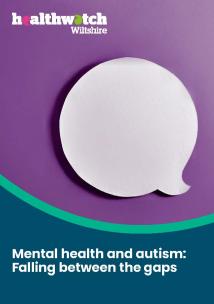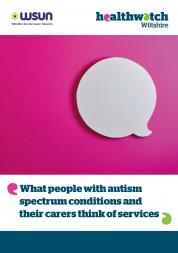Mental health and autism: Falling between the gaps

What did we do?
The surveys ran in May and June 2023. We shared the surveys through the Wiltshire Service Users’ Network (WSUN) As We Are group for autistic people, through partner organisations including Wiltshire Parent Carer Council, and promoted the surveys through our social media channels and our website.
This work follows on from a previous project with WSUN in 2021 that gathered the views of people with autism spectrum conditions and their carers about health, care, and support services in Wiltshire.
What were the key findings?
- Autistic people, their carers and families told us of their desperation and frustration at not being able to get the help they need. Some say they have been unable to find any support. Autistic people said they felt isolated and misunderstood, and trying to get help was distressing.
- Most people went to their GPs as their first point of contact to get help but faced long waiting times for onward referrals to other services. People were also frustrated at being referred and re-referred.
- Autistic people did not find services helpful. They didn’t think the talking therapies offered were suitable for them and sometimes even made symptoms worse.
- Mental health staff lack training, awareness and understanding of autism. Sometimes this has resulted in misdiagnosis and inappropriate treatment, or no support.
- Thresholds for getting mental health help are very high or inappropriate for autistic people.
- Some people said they had used expensive private consultants or therapists in an attempt to get help.
- Carers said the Child and Adolescent Mental Health Service (CAMHS) was overwhelmed and the waiting times very long.
- Waiting times for an autism diagnosis were seen as unacceptable, with little support or guidance post diagnosis.
- Communication difficulties faced by autistic people, coupled with a lack of flexibility from services – such as only offering phone calls rather than face to face appointments – creates a barrier for autistic people to be able to access help.
- The lack of suitable support has a long term impact on autistic people and their families/carers, with some becoming suicidal or a potential danger to others.
Conclusions and recommendations
It is clear that autistic people and their carers have struggled to access support for their mental health, and this has had a serious impact on them and their families. We have made a number of recommendations based on the feedback we have heard.
Downloads
If you would like this report in a different format, email info@healthwatchwiltshire.co.uk or call 01225 434218.
